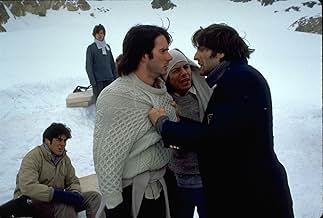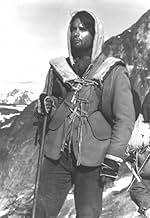Uma equipe uruguaia de rúgbi encalhada na neve varrida pelos Andes, é forçada a usar medidas desesperadas para sobreviver após um acidente de avião.Uma equipe uruguaia de rúgbi encalhada na neve varrida pelos Andes, é forçada a usar medidas desesperadas para sobreviver após um acidente de avião.Uma equipe uruguaia de rúgbi encalhada na neve varrida pelos Andes, é forçada a usar medidas desesperadas para sobreviver após um acidente de avião.
- Prêmios
- 1 vitória e 1 indicação no total
- Antonio 'Tintín' Vizintín
- (as John Haymes Newton)
- Rafael Cano
- (as Michael De Lorenzo)
- Eduardo Strauch
- (as Gian Di Donna)
- Direção
- Roteiristas
- Elenco e equipe completos
- Produção, bilheteria e muito mais no IMDbPro
Enredo
Você sabia?
- CuriosidadesThe real Nando Parrado (Ethan Hawke's character) was technical advisor to the film.
- Erros de gravaçãoRoberto Canessa is shown sitting beside Nando Parrado in the rescue helicopter. Canessa never made that trip; he was by that point so debilitated by the dysentery he had battled for much of the trek over the mountains that he could no longer walk.
- Citações
Nando: Between these mountains somewhere there's a green valley. See these mountains over here? There's no snow on them.
Roberto Canessa: Those mountains must be fifty miles away. You think you can walk fifty miles?
Nando: If we have to, we will.
Roberto Canessa: I can't.
Nando: Yes, you can.
Roberto Canessa: I can't. I'm not as strong as you.
Nando: Do you know what it is that we've lived this long the way we have? Seventy days? That we climbed this mountain. You know what it is? It's impossible. It's impossible and we did it. I'm proud to be a man on a day like this. Alive. That I lived to see it, and see it in such a place. Take it in. I love you, man. Look, it's magnificent. It's God. And it'll carry us over every stone, I swear. I swear to you.
- Cenas durante ou pós-créditosIn the North American prints, the Touchstone Pictures logo appears at the beginning and at the end, along with the Buena Vista Pictures Distribution disclaimer appears after the credits, meanwhile the international prints had the 1989 version of the 1987 Paramount Pictures logo with the animation at the beginning and the still one at the end.
- ConexõesFeatured in Siskel & Ebert & the Movies: Matinee/Alive/Body of Evidence/Sniper (1993)
- Trilhas sonorasThe Look Of Love
Written by Burt Bacharach & Hal David
However, if triumphing over two months of cold and starvation, punctuated with a deadly avalanche, was nothing short of a miracle, even for people raised in the Catholic faith, that simplification might also satisfy a natural craving for sensationalism while harming the memory of those who died. So a film like Frank Marshall's "Alive" or any documentary retelling the harrowing (and sometimes horrifying) journey of the Vol 571 survivors is, at least in intentions, an extraordinary tribute to human solidarity and determination when facing a cruel adversity.
Released in 1993, the film retells the story of the survivors stranded in the Andean mountains for 70 days in 1972. It opens with an aged one (played by John Malkovich) showing a few pictures caught days before the crash where they're all young, wearing rugby uniforms, their faces illuminated by the sun. What the narrator says is a piece of wisdom inherited from the journey and shared with us outsiders: we can't tell what we would do until we're put in the situation. Besides, it's not just a matter of surrendering to death or fight for life, the question raised by the first ten minutes is even simpler: "would we be among the lucky ones?" so the plane crash sequence isn't just generous in spectacular special effects but in various occasions to contemplate these scary thoughts while watching someone plunging to his death.
The plane sequence is a masterstroke, starting with the set-up: we see young and healthy kids from privileged backgrounds, wearing blazers or spring clothes and all acting like spoiled brats under adult's indulgent eyes, one plays his guitar, another with the microphone, some exchange views about rugby and girls; joy is everywhere and spirits are high, much higher than the plane that finds itself engulfed in a storm and the "air pocket" get so persistent the passengers stop taking them in all stride. Some don't even have time to realize it's no joke, as the tail breaks, they're sucked off the air, then the plane slides down a snow drift, and passengers pray and scream.
Suddenly, the plane stops and the deceleration pushes everything forward, those in the front weren't much luckier than those in the back as they're crushed instantly by the seats piling up on them, and a few kids are literally projected to the cockpit wall. There's absolutely no correlation whatsoever between the seats and the odds, one can unharmed while his neighbor passed away, one would get a black eye and his friend would later die from internal injuries. That's the big lottery of life, who's going to make it and who won't have to bother. "Why you and not me?".
So the questioning of God's will and the omnipresence of religious undertones (something Ebert and Siskel complained about) is actually capital to understand the way the passengers' frames of mind will evolve. It wasn't just a psychological wrestling with the elements but also with a certain vision of God and destiny, a long apprenticeship divided into three chronological phases.
First, the survivors realize that they must form a sort of micro-society and the team captain, confident that the rescuers will come, organizes the rationing: a daily square of chocolate and a sip of wine. The dead are taken out and will never be absent from the site nor their friends' thoughts, seat covers are used as blankets and the first aids are given. Interestingly, it's only after being able to sleep the first night that they feel the exhilaration of being alive. Surviving the night and its freezing effect is one of the key challenges with food, and each day is a new triumph.
But there's a catch in their motivation, it works within the certitude that these solutions are temporary. A few days go, the badly wounded die and the others learn that the searches have been abandoned, a final blow on the captain who feels responsible for giving false hopes and gets depressed. Meanwhile, new leaders emerge: Nando Parrado (Ethan Hawke) who spent the first days dazed and unconscious, wakes up before his sister dies, he takes her to the snow and takes off the coat she wouldn't need anymore, he decides that he must survive even if it means breaking the ultimate taboo, his friend Roberto Canessa (John Hamilton) also knows there's only one alternative to food.
Get busy living or get busy dying; without meat, bodies will fade to a certain death, so it's a whole new dimension of thoughts and perceptions, one that asks for a discussion and a total agreement. The film deals with the desecration soberly, no red flesh is shown, first a few muscle fibers are taken and distributed to the group, like a mystical communion, that chapter is handled rather tactfully until the necessity of meat is validated during the final phase, when an avalanche proves them that the snow and mountain weren't as lifeless and indifferent as they thought, and they were at the mercy of a living entity that could take their lives at any moment. Later, some "meat" would be shown as the only way for the "scouts" to go as far as possible to find a village, the dead offer their muscles, so to speak.
Life will find a way.
A film like "Alive" is more a humbling than a mystical experience, it's a story that transcends our beliefs in our capabilities. And if the film isn't totally flawless, it's simply because some stories, like "Papillon" for instance, are just so larger-than-life than even a film wouldn't do them justice, but speaking for myself, I had seen that film only once on a Sunday night of 1996 before watching it again on Netflix, and I was surprised by how vivid my memory was, and many details stuck to my memory. And at the end, I was cheering as intensely as I did 23 years ago.
- ElMaruecan82
- 9 de jul. de 2019
- Link permanente
Principais escolhas
- How long is Alive?Fornecido pela Alexa
Detalhes
Bilheteria
- Orçamento
- US$ 32.000.000 (estimativa)
- Faturamento bruto nos EUA e Canadá
- US$ 36.733.909
- Fim de semana de estreia nos EUA e Canadá
- US$ 8.624.292
- 18 de jan. de 1993
- Faturamento bruto mundial
- US$ 36.733.909
- Tempo de duração2 horas 8 minutos
- Cor
- Mixagem de som
- Proporção
- 1.85 : 1
Contribua para esta página




































